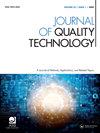正交最小混叠响应面设计数据分析
IF 2.2
2区 工程技术
Q2 ENGINEERING, INDUSTRIAL
引用次数: 1
摘要
由于实验设计的使用,实验数据往往是高度结构化的。这不仅简化了分析,而且允许定制分析方法,从数据中提取比一般方法更多的信息。适合这种定制方法的一组三水平实验设计是正交最小混叠响应面(OMARS)设计(Núñez Ares和Goos 2020),其中所有主要效应彼此正交,并与所有二阶效应正交。Jones和Nachtsheim(2017)基于设计的分析方法在检测主动效应的能力方面比现有方法有了显着改进。然而,他们的方法的应用仅限于被称为确定筛选设计(dsd)的OMARS设计的一小部分亚组。在我们的工作中,我们不仅改进了dsd的Jones和Nachtsheim方法,而且我们还将其分析框架推广到整个OMARS设计家族。通过广泛的模拟,我们表明,与其他现代(非基于设计的)分析方法相比,我们用于分析OMARS设计数据的定制方法在识别主动效应方面非常有效,特别是在真实模型复杂且涉及许多二阶效应的情况下。本文章由计算机程序翻译,如有差异,请以英文原文为准。
Analysis of data from orthogonal minimally aliased response surface designs
Abstract Experimental data are often highly structured due to the use of experimental designs. This does not only simplify the analysis, but it allows for tailored methods of analysis that extract more information from the data than generic methods. One group of three-level experimental designs that are suitable for such tailored methods are orthogonal minimally aliased response surface (OMARS) designs (Núñez Ares and Goos 2020), where all main effects are orthogonal to each other and to all second-order effects. The design based analysis method of Jones and Nachtsheim (2017) has shown significant improvement over existing methods in terms of powers to detect active effects. However, the application of their method is limited to only a small subgroup of OMARS designs known as definitive screening designs (DSDs). In our work, we not only improve upon the Jones and Nachtsheim method for DSDs, but we also generalize their analysis framework to the entire family of OMARS designs. Using extensive simulations, we show that our customized method for analyzing data from OMARS designs is highly effective in identifying active effects when compared to other modern (non-design based) analysis methods, especially in cases where the true model is complex and involves many second-order effects.
求助全文
通过发布文献求助,成功后即可免费获取论文全文。
去求助
来源期刊

Journal of Quality Technology
管理科学-工程:工业
CiteScore
5.20
自引率
4.00%
发文量
23
审稿时长
>12 weeks
期刊介绍:
The objective of Journal of Quality Technology is to contribute to the technical advancement of the field of quality technology by publishing papers that emphasize the practical applicability of new techniques, instructive examples of the operation of existing techniques and results of historical researches. Expository, review, and tutorial papers are also acceptable if they are written in a style suitable for practicing engineers.
Sample our Mathematics & Statistics journals, sign in here to start your FREE access for 14 days
 求助内容:
求助内容: 应助结果提醒方式:
应助结果提醒方式:


